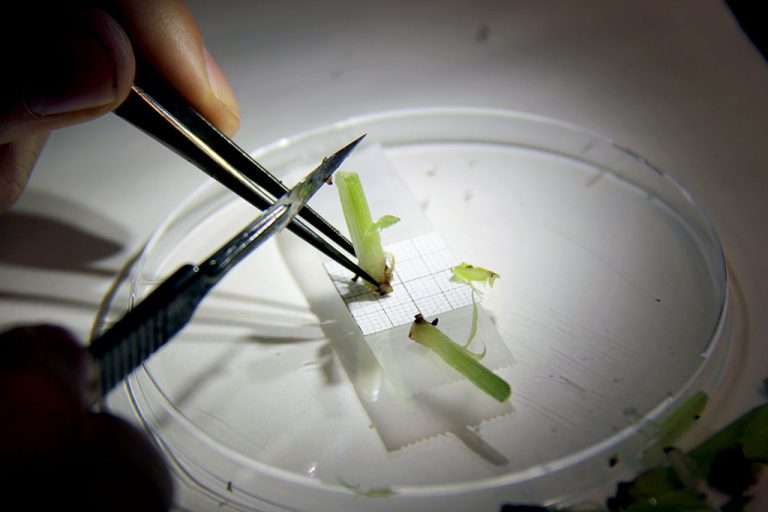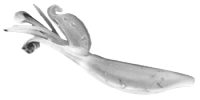
Bioversity International
Musa Germplasm Transit Centre
c/o KU Leuven
Division of Crop Biotechnics
Laboratory of Tropical Crop Improvement
Willem de Croylaan 42 box 2455
BE3001 Heverlee
Belgium
Contact: Ines Van den Houwe
Email: i.vandenhouwe@ cgiar.org
The material in this collection has been assembled through donations from other (field) gene banks, breeding programmes and through collecting expeditions that the Alliance of Bioversity and CIAT (formerly INIBAP) organized with members of the network, with the aim of setting up a safety back-up system for these genetic resources.
The collection was also set up as part of a system for easy and safe exchange of germplasm; being maintained in vitro, located in a non-banana growing country and linked up virus indexing facilities, the collection functions as an international germplasm distribution center.

Above left: Musa spp plantlets in the ITC in vitro collection are stored in tubes under slow growth conditions. Above rightight: The ITC in vitro collection is backed up in cryopreservation tanks maintained at -196 degrees Celsius.
In 1994 the ITC collection became an FAO ‘in trust’ collection’ for which the Alliance of Bioversity and CIAT has the commitment to ensure the long term storage of holdings and provide unrestricted access by the Musa community. Since 2006, the collection is part of the multilateral system of the ITPGRFA and germplasm exchanges occur in accordance with the SMTA of the ITPGRFA.
The ITC global banana collection covers the widest range of Musa diversity from numerous geographic areas, in particular plantains originating from West and Central Africa, Highland bananas from East Africa and cultivated and wild forms collected in Papua New Guinea. The collection also holds many wild Musa species.
Obtaining material from this collection
Germplasm held in the ITC genebank that has been indexed virus negative is freely available for international distribution upon request. For requests or more information on how to obtain material from the international Musa germplasm collection, please go to the online ordering system on MGIS by clicking here.
Germplasm is distributed under the terms and conditions of a Standard Material Transfer Agreement (SMTA) of the Multilateral System of Access and Benefit Sharing of the International Treaty (PDFs: English, French, Spanish) on Plant Genetic Resources for Food and Agriculture. As from 1 February 2008, the SMTA is being used for transferring all plant genetic resources for food and agriculture, whether or not they are included in Annex 1 of the Treaty. Additional Conditions to the SMTA may apply for the distribution of Material under Development (breeding materials acquired by Bioversity International from Crop Improvement Programmes worldwide).
You can download the pdf-files of the SMTA and Additional Conditions to the SMTA here:
SMTA English (0.2MB), SMTA French (0.2MB), SMTA Spanish (0.2MB), SMTA in other languages

If you agree to the terms and conditions set out in the agreement, please contact the ITC to request the germplasm of your interest. Kindly provide the following information: name and address of the recipient or receiving institution, name and contact information of the authorized official, and list of germplasm you wish to receive. Also, provide a brief summary of the intended use of the plant genetic resources.
The ITC will send you an order form and the SMTA for signature. You also will be requested to provide the ITC an import permit obtained from the Plant Protection Service of the receiving country, if required. Upon receipt of the signed SMTA and the import permit, the ITC will process your order. The plant material will be provided as in-vitro rooted plantlets for soil planting or as proliferating shoot clusters for further in-vitro propagation. Usually five samples per accession are supplied. For a wide range of accessions, lyophilized leaf tissues are also available in order to respond to requests for DNA. Delivery time depends on the type of plant material requested and ranges between 2 and 4 months for in-vitro cultures and is about 2 weeks for lyophilized leaf tissues. The material will be accompanied by a health statement, phytosanitary certificate and a copy of the SMTA.
Sending material to this collection
Most accessions acquired by the genebank are held in trust for the benefit of humanity. They are conserved under the conditions of an agreement signed between Bioversity and the Governing Body of the International Treaty on Plant Genetic Resources for Food and Agriculture (PGRFA), placing these materials in the Multilateral System of Access and Benefit Sharing.
If you would like to send germplasm to the ITC for the purpose of safety duplication and to share it with the Musa research community or other interested parties, please contact the ITC or Bioversity.
For more information
Visit the Musa Germplasm Information System (MGIS) at https://www.crop-diversity.org/mgis/collection/01BEL08
To read articles in which the ITC is mentioned: www.musalit.org/saveSearch.php?id=a6b79f6cf06f1a05cbb8e16d6c6d4c8a

